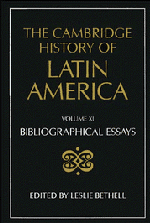Book contents
- Frontmatter
- I THE INDIGENOUS PEOPLES OF MIDDLE AND SOUTH AMERICA ON THE EVE OF THE CONQUEST
- II COLONIAL SPANISH AMERICA
- III COLONIAL BRAZIL
- IV THE INDEPENDENCE OF LATIN AMERICA
- V LATIN AMERICA: ECONOMY, SOCIETY, POLITICS, c. 1820 TO c. 1870
- VI LATIN AMERICA: ECONOMY, SOCIETY, POLITICS, c. 1870 to 1930
- VII LATIN AMERICA: ECONOMY, SOCIETY, POLITICS, 1930 to c. 1990
- 1 Population
- 2 The Latin American economies, 1929–1939
- 3 The Latin American economies, 1939–c. 1950
- 4 The Latin American economies, 1950–1990
- 5 Urban growth and urban social structure
- 6 Agrarian structures
- 7 State organization
- 8 Democracy
- 9 The Left
- 10 The military in politics
- 11 The urban working class and labour movements
- 12 Rural mobilizations
- 13 Women in twentieth-century Latin America
- 14 The Catholic church
- 15 The Protestant churches
- 16 Mexico, c. 1930–1946
- 17 Mexico since 1946
- 18 Central America
- 19 Guatemala
- 20 El Salvador
- 21 Honduras
- 22 Nicaragua
- 23 Costa Rica
- 24 Panama
- 25 The Panama Canal Zone, 1904–1979
- 26 Cuba, c. 1930–1959
- 27 Cuba since 1959
- 28 The Dominican Republic
- 29 Haiti
- 30 Puerto Rico
- 31 Argentina, 1930–1946
- 32 Argentina since 1946
- 33 Uruguay
- 34 Paraguay
- 35 Chile, c. 1930–c. 1960
- 36 Chile since c. 1960
- 37 Peru, 1930–c. 1960
- 38 Peru since c. 1960
- 39 Bolivia
- 40 Colombia
- 41 Ecuador
- 42 Venezuela
- 43 Brazil
- VIII IDEAS IN LATIN AMERICA SINCE INDEPENDENCE
- IX LATIN AMERICAN CULTURE SINCE INDEPENDENCE
- X THE INTERNATIONAL RELATIONS OF LATIN AMERICA SINCE INDEPENDENCE
- THE CAMBRIDGE HISTORY OF LATIN AMERICA
32 - Argentina since 1946
from VII - LATIN AMERICA: ECONOMY, SOCIETY, POLITICS, 1930 to c. 1990
Published online by Cambridge University Press: 28 March 2008
- Frontmatter
- I THE INDIGENOUS PEOPLES OF MIDDLE AND SOUTH AMERICA ON THE EVE OF THE CONQUEST
- II COLONIAL SPANISH AMERICA
- III COLONIAL BRAZIL
- IV THE INDEPENDENCE OF LATIN AMERICA
- V LATIN AMERICA: ECONOMY, SOCIETY, POLITICS, c. 1820 TO c. 1870
- VI LATIN AMERICA: ECONOMY, SOCIETY, POLITICS, c. 1870 to 1930
- VII LATIN AMERICA: ECONOMY, SOCIETY, POLITICS, 1930 to c. 1990
- 1 Population
- 2 The Latin American economies, 1929–1939
- 3 The Latin American economies, 1939–c. 1950
- 4 The Latin American economies, 1950–1990
- 5 Urban growth and urban social structure
- 6 Agrarian structures
- 7 State organization
- 8 Democracy
- 9 The Left
- 10 The military in politics
- 11 The urban working class and labour movements
- 12 Rural mobilizations
- 13 Women in twentieth-century Latin America
- 14 The Catholic church
- 15 The Protestant churches
- 16 Mexico, c. 1930–1946
- 17 Mexico since 1946
- 18 Central America
- 19 Guatemala
- 20 El Salvador
- 21 Honduras
- 22 Nicaragua
- 23 Costa Rica
- 24 Panama
- 25 The Panama Canal Zone, 1904–1979
- 26 Cuba, c. 1930–1959
- 27 Cuba since 1959
- 28 The Dominican Republic
- 29 Haiti
- 30 Puerto Rico
- 31 Argentina, 1930–1946
- 32 Argentina since 1946
- 33 Uruguay
- 34 Paraguay
- 35 Chile, c. 1930–c. 1960
- 36 Chile since c. 1960
- 37 Peru, 1930–c. 1960
- 38 Peru since c. 1960
- 39 Bolivia
- 40 Colombia
- 41 Ecuador
- 42 Venezuela
- 43 Brazil
- VIII IDEAS IN LATIN AMERICA SINCE INDEPENDENCE
- IX LATIN AMERICAN CULTURE SINCE INDEPENDENCE
- X THE INTERNATIONAL RELATIONS OF LATIN AMERICA SINCE INDEPENDENCE
- THE CAMBRIDGE HISTORY OF LATIN AMERICA
Summary
economy
G. Di Telia and M. Zymelman, Las etapas del desarrollo economico argentino (Buenos Aires, 1967), is a general work inspired by W. W. Rostow’s stages of growth theory. Aldo Ferrer, The Argentine Economy (Berkeley, 1967), first published in Spanish in 1964, is a less factual, much more interpretive account that reflects views on development and dependency typical of the late 1950s and early 1960s. Ferrer’s Crisis y alternativas de la política económica (Buenos Aires, 1977) brings the analysis up to the late 1970s. Carlos Díaz Alejandro, Essays on the Economic History of the Argentine Republic (New Haven, Conn., 1970), is a collection of excellent economic analyses of different aspects of Argentine history that has been very influential. Laura Randall, An Economic History of Argentina in the Twentieth Century (New York, 1978), tries to interpret Argentina’s development as a succession of rather clear-cut economic models; some historians have found it unconvincing. R. Mallon and J. V. Sourruoille, Economic Policy in a Conflictive Society: The Argentine Case (Cambridge, Mass., 1975), explores economic problems, particularly in the mid-1960s, without excluding political variables.
D. Rock, Argentina, 1516–1987: From Spanish Colonization to Alfonsín (Berkeley, 1987), is a comprehensive history that reveals great economic insight; it is the best introduction to the history of Argentina in this period. Gary Wynia, Argentina in the Post-War Era: Politics and Economic Policy Making in a Divided Society (Albuquerque, N.Mex., 1978), concentrates on decision making in the period from 1946 to 1976. Two general essays discuss the main issues in the economic history of the period: G. Di Telia, ‘Controversias económicas en la Argentina, 1930–1970’, in J. Fogarty, E. Gallo and H. Diéguez (eds.), Argentina y Australia (Buenos Aires, 1979); and C. Díaz Alejandro, ‘No less than one hundred years of Argentine economic history plus some comparisons’, in G. Ranis, R. L. West, M. W. Leiserson and C. Taft Morris (eds.), Comparative Development Perspectives: Essays in Honor of Lloyd G. Reynolds (Boulder, Colo., 1984).
- Type
- Chapter
- Information
- The Cambridge History of Latin America , pp. 752 - 763Publisher: Cambridge University PressPrint publication year: 1995
- 1
- Cited by



